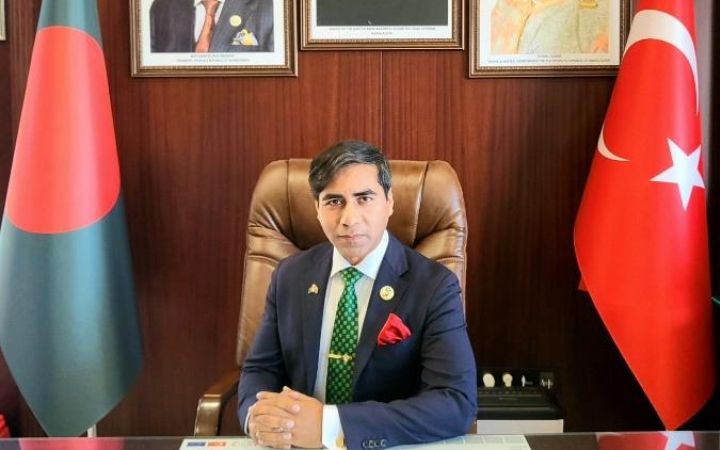Ambassador Amanul Haq, Ambassador of Bangladesh to the Republic of Türkiye
Ankara, Türkiye
Chapter VIII of the UN Charter highlights the importance of cooperation with regional arrangements and agencies for the purpose of the maintenance of peace and security. UNITAR’s Fellowship Programme in Peacemaking and Preventive Diplomacy, now in its 31st year, is unique in bringing together mid- and senior-level diplomats with regional organization representatives and UN staff to provide intensive training in conflict analysis, negotiation and mediation. The first of its kind in the United Nations system, the programme invites senior UN and regional organization staff, top academics and practitioners to serve as senior resource persons, sharing their lessons and strategies with Fellows from around the world.
Mr. Amanul Haq currently serves as Ambassador of Bangladesh to the Republic of Türkiye. He was invited to take part in the UNITAR Fellowship Programme when he was a staff member of the Organization of Islamic Cooperation (OIC), serving as a Professional Officer and then looking after the political department. “OIC at that time did not have any specific personnel who dealt with peace, conflict resolution and preventive diplomacy issues. It was for that reason that OIC cooperated with the UN Mediation Support Unit, which introduced me to the UNITAR Fellowship Programme in Peacemaking and Preventive Diplomacy.” Each year OIC Fellows are invited to take part in the UNITAR programme, which takes place in Norway.
He recalls lessons from his participation as a Fellow and subsequent leadership in the OIC’s Peace, Security and Conflict Resolution Unit, which contributes to enhancing cooperation between the OIC and the UN to strengthen preventive approaches and structures for peace.
“The UNITAR Fellowship Programme was an intensive nine working days programme, including one weekend. It was a combination of practical and theoretical experiences, with a variety of resource people, including Special Representatives of the Secretary-General (SRSGs), coming and going. They delivered theories and several case studies as well. The practical part was most interesting with several case studies.
“The participating officials were put in several roles, such as different parties and mediators. Information was shared in a gradual manner, which meant when you were planning on one issue, then something unexpected happened because in real life you can never predict a conflict situation. In the beginning, it was a bit stressful with everybody inside their roles in such a deep manner. Even though we were not in real life, we were getting angry, sad, and feeling our full emotions. In the end, we shared our experiences and related them to practical cases we were dealing with. In the evenings, we were a bit relaxed, and there was interaction and social gatherings, and all of these things also helped. The best part for me, actually, was that I came to know different conflict resolution professionals, both resource persons and participating officials. That really helped me to enlarge and enrich my knowledge and enlarge my network of peer conflict resolution professionals.”
Amanul Haq joined the Ministry of Foreign Affairs of Bangladesh in Dhaka in 1999, then served as Consul and Deputy Head of Mission at the Bangladesh Consulate General in New York. He joined the OIC Headquarters in Jeddah in 2006 on secondment, where he later became the Acting Director General of the Cabinet and Advisor to the Secretary-General. After returning to the Ministry of Foreign Affairs, Mr. Haq assumed the position of Director General.
Ambassador Haq also cites the importance of the contribution of women to peace efforts. “From the Fellowship Programme, I acquired some background to start working on [the contribution of women to peace efforts]. The OIC Secretary-General had the power to create some units for a specific reason under the Cabinet of the Secretary-General. So that's how this was developed. Then, as a part of this unit, we created a Wise Persons Council (WPC), to bring in eminent persons’ expertise, knowledge and political acumen, and to get some new ideas about finding a solution to a specific conflict situation.”
“I must also underline that it was very important for an organization like OIC to incorporate proper gender policies. We went to international trainings and came back to the Secretary-General to suggest encouraging women OIC colleagues to go in for these trainings to see how women leaders were actually contributing in dealing with some very difficult conflicts. I still recall the case study that we had […] about the Irish Republican Army (IRA) in Ireland.
“For a few decades, it is evident that the UN is not the only actor in conflict prevention and resolution. Regional organizations, the Arab League, the African Union and the Organization of American States, may have advantageous positions vis-à-vis some conflict situations. The UN, of course, is a kind of umbrella organization with a lot of resources and expertise. But at the same time, the UN Secretary-General is convinced of the merits of engaging regional organizations, knowing that, in the field, they are the ones who know the situations better.”
At one point, both the OIC Observer Missions in New York and Geneva were headed respectively by a male alumnus and a female alumnus of UNITAR’s Programmes in Peacemaking and Conflict Prevention. UNITAR continues to invite officials from the OIC and regional organizations around the world to take part in preventive diplomacy and peacemaking programmes at international and regional levels to continue to strengthen these vital capacities and enhance strategic collaboration for peace.


